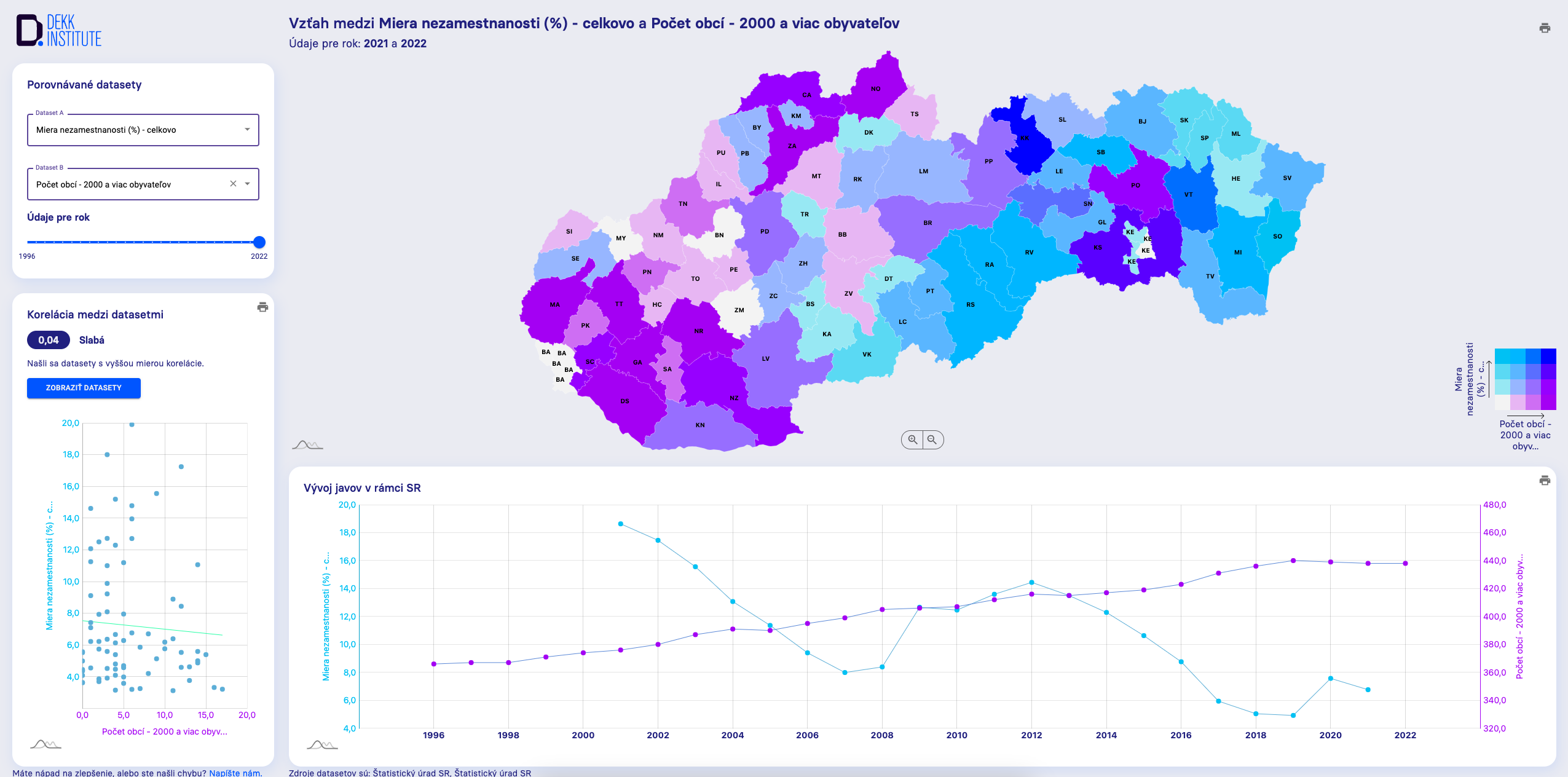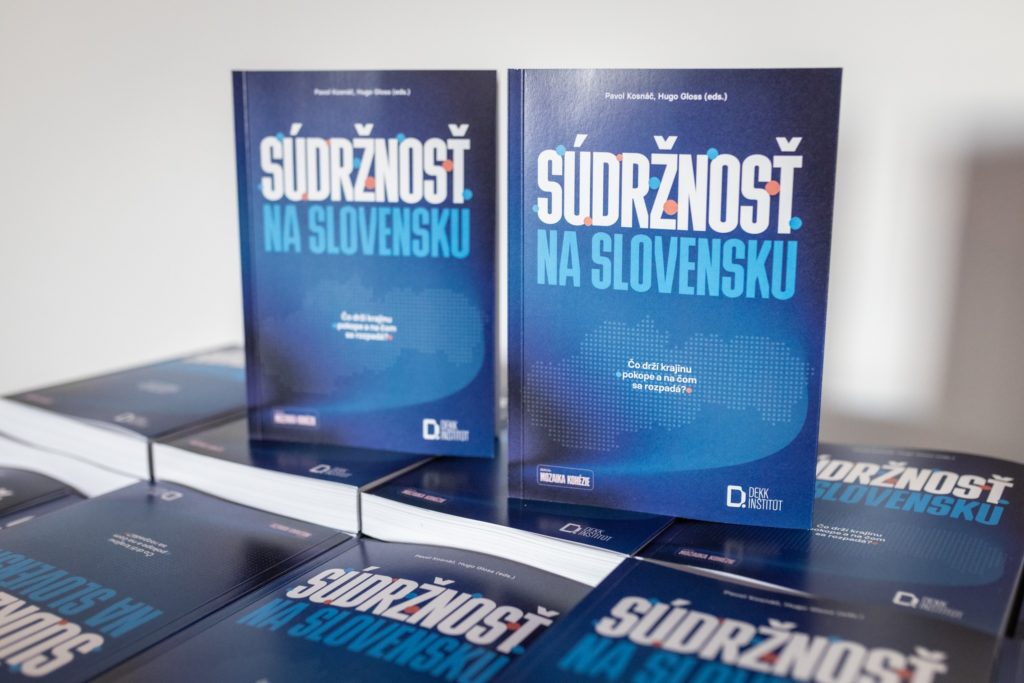
The goal of the project is to build a database of complex social scientific data, which will be a one stop shop on the Internet for people studying society in Slovakia. The primary customers are scientists and scientific institutions, but the database will also be open to government analysts, students, experts and the general public.
We are aware that working with data is not a standard skill. That is also why we decided to make available not only the collected or downloaded datasets, but also to design a set of analytical tools available through a simple and intuitive user interface, where even a person without IT or data analytical skills can perform basic analytical and statistical tasks within a minute, whether it is simple visualization of data on the map of Slovakia, supplementing qualitative research with quantitative datasets or searching for data correlations that can be used to obtain data for further research.
Basic access to the analytical tool is free, as it is part of the mission of the DEKK Institute and we perceive it as our contribution to the development of science and the quality of professional discussion by simplifying the access of the general public and students to high-quality and complex social science data.
We would also like to encourage any user to contact us with possible constructive criticism or, conversely, with the results of research that our data has contributed to. We will be happy to hear both.
In 2021, the implementation of the Slovakia in Data project was supported as a project entitled "Slovakia in data: support of civil society and democratic institutions through data analysis" from the ACF - Slovakia program, which is financed by the EEA Financial Mechanism 2014-2021.

The 7th wave of the WVS was collected by the FOCUS agency on a sample of 1,200 respondents using the random walk method collected using "Face to Face" structured interviews. It is one of the most representative methods, which bypasses the methodological problems of internet panels and the limits of call centers, while adhering to strict international standards of post-survey checking according to the methodological requirements of the World Values Survey Association.
The WVS collects standard socio-demographic and economic data, data related to religious and political beliefs, relation to institutions and the state establishment, moral values, the impact of globalization, attitudes to the environment, work, family, national identity, cultural issues, diversity and overall life satisfaction.
Joining the WVS helps put Slovakia back on the data map of the world. Data from the survey in Slovakia are available on the World Values Survey Association website in the "Data and Documentation" section.

The long-term vision of the DEKK Institute is to understand the problem of the decline and regeneration of social cohesion in Slovakia and Europe. Social cohesion is a term describing the forces that hold human groups together - and it is trust that is an important condition for the cohesion of any society.
Therefore, the goal of Trends [dis]trust is to annually bring relevant data on the state of trust in Slovak society. The collected data will offer us a better overview of the current situation and help identify areas that require increased attention - from the citizens and the state.
The ambition of the document is to bring basic data on the state of trust to the public debate. The document does not aim to provide an exhaustive analysis of the state of mistrust and its causes, but offers a basic commentary that can guide the reader.
Trust is not an abstract concept, but it affects our daily life and its quality. Low trust has a negative impact on the economy and the contents of our wallet, on street safety, corruption and nepotism, on subjective life satisfaction, on the cohesion of communities, and last but not least, it affects our ability to respond effectively to crises. For details, see the chapter "Social cohesion and [dis]trust".
In Slovakia, we regularly collect data on average life expectancy, wages and unemployment, but we are less systematic about investigating the values, frustrations and beliefs of the population. Slovakia is currently in danger of disintegrating the fabric of society, and to diagnose this problem we need data related to values and identity. However, these data are measured only occasionally. If we want to better understand the problem of the breakdown of cohesion and trust, we need to build a culture of strategic data collection. This means participating in international surveys, designing surveys tailored to Slovak society and systematically maintaining them in order to monitor social trends.
The survey results themselves are not very pleasant, but we wish you an inspiring read. The first step in solving any problem is to know the reality. Only then look for ways to improve it.
There is no expert consensus and definitive list of factors that influence social cohesion. At the same time, there are large differences in how cohesion is understood by scholars and how it is understood by the various analytical institutes that help to prepare public policies, from the UN and EU to the national and municipal levels. Scholars focus on the mechanisms that influence cohesion, while applied analysis for public policies is more concerned with the outcomes of cohesion, sometimes unfortunately confusing the cause and effect. This contradiction can be solved by a stronger connection between scientific and applied analyzes and by summarizing their conclusions under one (virtual) roof. At the DEKK Institute, we have the ambition to describe and connect these spheres, as the given approaches are compatible, but require cooperation. Our goal is to compile the most complete interdisciplinary meta-analysis of social cohesion in the world and subsequently a practical list of areas and recommendations that need to be taken into account when designing public policies, which will subsequently create conditions for strengthening interpersonal trust, same as the trust between citizens and the state.

Part of the Cohesion Mosaic project will also be an edition of books on cohesion, trust, cooperation and patriotism, which will examine these topics from the point of view of various scientific fields in combination with probes into the issue from experts from practice. You can find more information about the edition in the "Publications" section.
The guarantors of the project are the Scientific advisory board of the DEKK Institute and prof. LeRon Shults of the University of Agder in Norway. In the future, the quantification of these factors in the form of the Cohesion Index will be added within the Mosaic. We expect the first more complex practical results in 2025.

DEKK Institute has been working on the phenomenon of shifting values since its inception, which is why it became a partner of Charles University within the Central European Digital Media Observatory (CEDMO), a project supported by the European Commission. Charles University chairs the Central European consortium of universities, research institutes and partner organizations from the Czech Republic, Slovakia, Poland, France and Greece.
Within the CEDMO project, there are several teams dedicated to various research topics related to contemporary social dynamics: from the group focused on the information environment and fact-checking, through the expert group of epidemiologists and addictologists to the team assembled by the DEKK Institute, called CEDMO Social Values and Attitudes Team, whose principal investigator is Pavol Kosnáč, director of the DEKK Institute.
CEDMO-SVA, in which nine researchers from the DEKK Institute, Charles University and other institutions from five different countries join forces, has focused on several key topics of contemporary social development since 1990 to the present, specifically:
The given topics are investigated by the research team using interdisciplinary tools of social and cognitive sciences, data analysis and scientific opinion polls.
Particularly valuable is the cooperation of Charles University and the DEKK Institute in the collection of the Slovak and Czech World Values Survey (the 7th wave was published at the end of 2022, the 8th wave will be published at the end of 2024) and the Czech longitudinal survey 2023-2025, which monitors the development of opinions of the Czech population almost every month for a period of three years. For now, Slovakia can only dream of such an in-depth insight into our society. We are proud to be there when the Czech Republic embarks on a similar project.
The outputs of the work of the CEDMO-SVA team can be regularly accessed in the form of popular scientific microblogs (so-called "Coffee Beans"), research and policy papers with recommendations for state analysts and officials, and, of course, papers in scientific journals. Our work can be accessed on the CEDMO project website.
DEKK Institute is a member of the advisory board of the Forgiveness and Future Building project at the Woolf Institute at the University of Cambridge in Great Britain.
Colleagues from the Woolf Institute decided to study how forgiveness works in (post)conflict societies, both at the interpersonal and group level, taking into account cultural and religious differences. The selected case studies are Northern Ireland, the Balkans and South Sudan. From 2023, Ukraine was also added.

The project will develop FORCAST (Forgiveness and Conflict Analysis Simulation Tool) – a system that uses multi-agent artificial intelligence designed to study the escalation and de-escalation of conflict between different groups, especially when it comes to complex religious and ethnic identities. This artificial intelligence system will enable public policy makers to better analyze the potential impacts of laws and government actions before they are implemented in the real world. It can thus help to avoid possible serious problems that the makers of public policies did not took into account due to the complexity of the current social dynamics.
We stood at the birth of the project and helped supplement the methodology of data analysis by providing qualitative expertise from the environment of military conflicts, with which the founding members of DEKK have experience from the period of humanitarian work and research in the Middle East and Africa, and later also in Ukraine. We also helped design polls and data collection methods that underpinned both the data analysis and the FORCAST system itself.
The preliminary results of the analyses show that mutual forgiveness among individual actors does not play a very significant role in ending conflicts. Sometimes the result of the research is that the primary hypothesis fails. The preliminary results were also presented in a popular-scientific form during our participation in the Forgiveness and the Future conference on February 22, 2023 in Belfast, on the 25th anniversary of the conclusion of the peace agreements in Northern Ireland.

The DATA Hackathon was held under the auspices of:
President of the Slovak Republic Zuzana Čaputová
and Institute for Strategies and Analyses (ISA) of the Slovak Government Office.
Design ways to visualize data - clearly and intuitively. The datasets World Values Survey, European Values Study, Eurobarometer and the series of datasets “Ako se máte, Slovensko?” from Slovak Academy of Sciences will be available.
Challenge 1 has three objectives:
During this challenge, you can also bring your own creative processings to visualize the data - there are no limits to creativity!
Design a way to make the datasets described above work together,
For both challenges, it was important to remember that the goal of the task is for anyone to be able to use the solution even without technical education/skills (including a student, a civil servant, academic, journalist or anyone interested in social cohesion).
© 2024 DEKK Institute | All rights reserved | CREA:THINK STUDIO
Michaela is currently finishing her bachelor's degree in psychology at the Faculty of Philosophy of the Comenius University in Bratislava. In psychology, neurocognitive topics, psychosomatics, identity building and community building are close to her heart. While still in grammar school, she was mentored by neuroscientist Dominika Fričová, who is dedicated to researching neurodegenerative diseases - in this topic, Michaela continues today in her current work under the guidance of neuropsychologist Petra Brandoburová in the Neuropsy laboratory.
Together with our research intern Filip, they managed to succeed at the international level of the ŠVOK (Student Scientific and Professional Conference).
At DEKK, she is currently processing statistics on the family behavior of the Slovak population. She is fascinated byobserving the life of diverse communities and their impact on the individual - from the Roma community, which is at the margins of society, where she volunteered, to the community of purposeful young people who yearn for knowledge at the Anton Neuwirth College, where Michaela completed her university program.
She likes to devote her free time to organizing events that contribute to a better society. She also enjoys a good psychology book, English classics, or time with friends.
Michaela je aktuálne v závere bakalárskeho stupňa v odbore psychológia na Filozofickej fakulte UK. Z psychológie sú jej blízke neurokognitívne témy, psychosomatika, budovanie identity a budovanie komunít. Ešte v čase gymnázia ju mentorovala neurovedkyňa Dominika Fričová, ktorá sa venuje výskumu neurodegeneratívnych ochorení - v tejto téme Michaela pokračuje aj dnes vo svojej súčasnej práci pod vedením neuropsychologičky Petry Brandoburovej v laboratóriu Neuropsy.
Spolu s našim výskumným stážistom Filipom sa im podarilo uspieť na medzinárodnej úrovni študentskej súťaže ŠVOK (Študentská vedecká a odborná konferencia).
V DEKKu sa v súčasnosti venuje spracovaniu štatistiky o rodinnom správaní slovenskej populácie. Fascinuje ju sledovať život rôznorodých komunít a ich vplyv na jednotlivca - od rómskej komunity, ktorá je na chvoste spoločnosti, kde dobrovoľníčila, až po komunitu cieľavedomých mladých v Kolégiu Antona Neuwirtha, ktorí túžia po poznaní, kde Michaela absolvovala vysokoškolský program.
Voľný čas rada venuje organizácii podujatí, ktoré prispievajú k lepšej spoločnosti, knihe od dobrého psychológa, či anglickej klasike alebo ho rada strávi s priateľmi.
Filip is in charge of working with psychological resources at DEKK.
After completing his undergraduate studies in psychology at Comenius University, he went to Utrecht University to gain study experience, but left after a period of time due to unfulfilled expectations. At the same time, he is a graduate of the two-year programme of the Anton Neuwirth College. It was there that he first encountered Aristotle and his idea that everything living in the world has a natural goal towards which it is directed: to prosper.
So he began to ask himself the question: if all beings have a goal deeply rooted in their nature, why do humans go against it and engage in destructive behavior? He sees in DEKK the hope of exploring part of this question, i.e., why societies fall apart. In addition, he is also interested in the individual dimension of this question: why do some individuals' lives fall apart? For this reason he has been involved in social assistance to homeless people in various low threshold centres in Bratislava or Brno.
In the past, he has organised several discussions with public figures, journalists and statesmen and also won the national competition ŠVOK in the category Psychology with his research.
In his free time he likes to read newspapers, listen to the Red Hot Chilli Peppers or sit in the city for a coffee.
Paulína is studying at the Bratislava International School of Liberal Studies on a bachelor's degree and at the same time she is studying in the Nexteria Leadership Academy 3-year development program, where she develops her soft skills and organizes community activities.
In the past, she worked on projects for Microsoft, Tatra banka, Slido and the city of Trenčín.
She likes to think about why society is the way it is. Her passion is psychology, informal education and self-development.
Michal Gačko is a graduate of the Faculty of Electrical Engineering and Informatics at the Slovak Technical University in the field of applied informatics. He studied for one semester in Norway at the Norwegian University of Science and Technology as part of the Erasmus program. He has experience in the design, implementation and management of various types of database systems, as well as in the design and implementation of architectural patterns and structures in software systems. In addition, it deals with data analysis and data visualization.
Veronika Cigáneková is an analyst focusing on public policies.
She graduated in philosophy from King’s College London, where she researched the connections between philosophy and public policy in the final stages of her studies. She later pursued a master’s degree in public policy at Sciences Po in Paris, with a focus on policy analysis, legislative development, and practical solutions. While in Paris, she also worked as an analyst at the OECD, specializing in public trust in institutions.
Currently, in addition to her work at DEKK, Veronika works alongside a member of the National Council of the Slovak Republic, focusing on culture and media.
Veronika has extensive experience in the non-profit sector, where she worked on themes such as civic participation, youth engagement, the development of social entrepreneurship, and the issue of the “brain drain” from Slovakia. Among her notable projects is the founding and two-year leadership of Nexteria Global HUB.
Hugo Gloss is the Chief Operating Officer (COO) of the DEKK Institute, responsible for the smooth running of the administration and is also responsible for the preparation and successful implementation of projects.
He studied International Relations and Diplomacy at the University of Bologna, Roma Tre University in Rome and completed a one-year training programme at the Anton Neuwirth College. He interned at the Representation Office of the Slovak Republic to the Holy See and at the Department of Communication and Prevention of the Presidium of the Police Force of the Slovak Republic. He worked at Accenture and coordinated humanitarian projects of the Caritas Slovakia in Iraq, Syria, Lebanon and Ukraine. As part of his work, he has visited countries where social cohesion is seriously weakened, and he is therefore concerned that Slovakia should not follow a similar path.
Since September 2024 he has been an internal PhD student at the Department of Sociology, Faculty of Arts, Comenius University in Bratislava. In his studies he focuses on researching the theory of social cohesion and developing an experimental model of its measurement and strengthening in Slovak society. He is married and has four children.
Pavol Kosnáč is the Scientific Director of the DEKK Institute and the Principal Investigator of the World Values Survey (WVS) program in Slovakia and the Czech Republic, which is covered by DEKK. He represents the DEKK Institute in the UNDP project analyzing social cohesion in Bosnia and Herzegovina. He is also the author of the program Slovakia in data, the aim of which is to accumulate and make available a database of complex social science data to the general and expert public.
During DEKK Institute's cooperation with Charles University in 2022-2023, he led a team of 9 scientists investigating the impact of social changes on the generational shift in values and social cohesion, applied for example in the analysis of the development of trust in governments in the V4 countries, the growing (un)willingness to defend the country or the impact of war on Ukrainian culture. During the same period, he was also a member of the advisory board of the Forgiveness and Future Building project at the University of Cambridge.
He studied comparative religious studies in Bratislava, Islam and philosophy of science at Oxford, and completed academic placements at the London School of Economics in London and Mahidol University in Bangkok. He received his doctorate in political science at Masaryk University in Brno.
He is interested in integration of field research methods, psychological and cognitive research tools, public opinion polls and big data. He specializes in the overlap between ideology, religion, violence and war. Experience from humanitarian and research projects in Central and Eastern Europe, the Middle East and India led him to try to understand the issues of complex systems, social cohesion and social stability.
He works as a consultant for humanitarian organizations and scientific workplaces in Great Britain, Ukraine, Iraq and Thailand. He is a registered (forensic) expert in the field of Social Sciences and Humanities in matters of religion at the Ministry of Justice of the Slovak Republic and represents the Slovak Republic in the World Association for Public Opinion Research (WAPOR) and the World Values Survey Association (WVSA). He is a member of the Slovak Society for the Study of Religions (SSŠN) in Bratislava, the Royal Anthropological Institute (RAI) in Great Britain, and a member of the advisory board of the Inform Institute at King's College London.